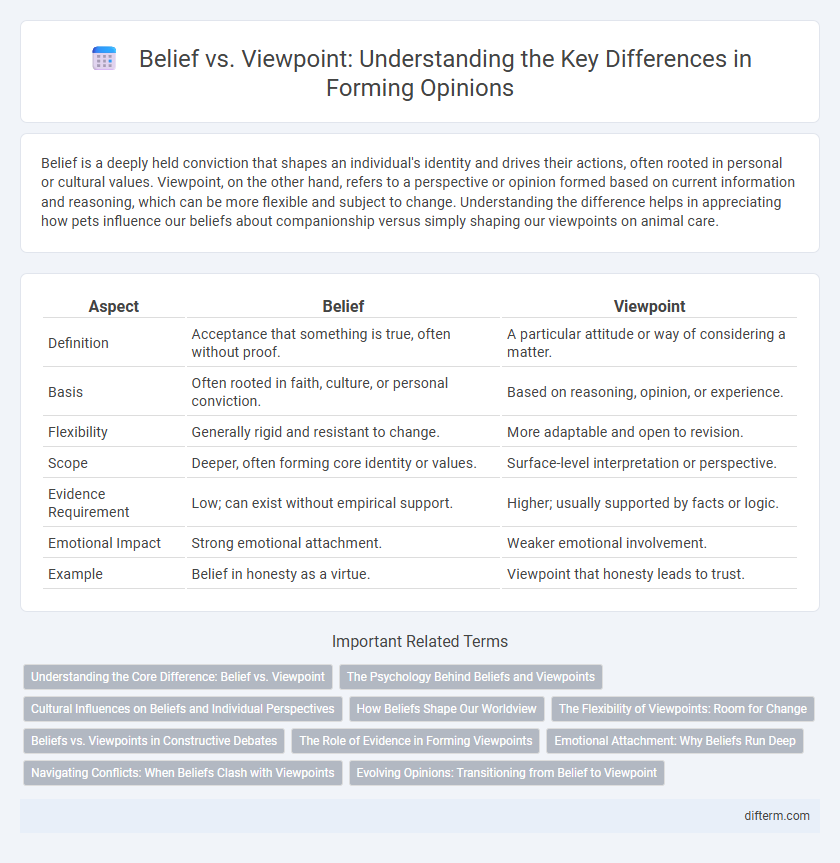Belief is a deeply held conviction that shapes an individual's identity and drives their actions, often rooted in personal or cultural values. Viewpoint, on the other hand, refers to a perspective or opinion formed based on current information and reasoning, which can be more flexible and subject to change. Understanding the difference helps in appreciating how pets influence our beliefs about companionship versus simply shaping our viewpoints on animal care.
Table of Comparison
| Aspect | Belief | Viewpoint |
|---|---|---|
| Definition | Acceptance that something is true, often without proof. | A particular attitude or way of considering a matter. |
| Basis | Often rooted in faith, culture, or personal conviction. | Based on reasoning, opinion, or experience. |
| Flexibility | Generally rigid and resistant to change. | More adaptable and open to revision. |
| Scope | Deeper, often forming core identity or values. | Surface-level interpretation or perspective. |
| Evidence Requirement | Low; can exist without empirical support. | Higher; usually supported by facts or logic. |
| Emotional Impact | Strong emotional attachment. | Weaker emotional involvement. |
| Example | Belief in honesty as a virtue. | Viewpoint that honesty leads to trust. |
Understanding the Core Difference: Belief vs. Viewpoint
Belief is a deeply held conviction rooted in personal values and experiences, often resistant to change, while a viewpoint is a more flexible perspective shaped by information and reasoning. Understanding this core difference highlights how beliefs influence identity and behavior, whereas viewpoints allow for adaptation and dialogue. Recognizing the distinction aids in effective communication and empathy across differing opinions.
The Psychology Behind Beliefs and Viewpoints
Beliefs are deeply rooted convictions shaped by personal experiences, emotions, and cultural background, often resistant to change due to their connection with identity and subconscious processes. Viewpoints, by contrast, are more flexible and cognitive, formed through reasoning, evidence evaluation, and social interactions, allowing for adaptation and revision over time. Understanding the psychological roots of beliefs and viewpoints reveals how cognitive biases, emotional investment, and social influences impact the way individuals process information and form opinions.
Cultural Influences on Beliefs and Individual Perspectives
Cultural influences profoundly shape beliefs by embedding shared values, traditions, and norms that individuals internalize from a young age, creating a framework that guides behavior and interpretation of experiences. Individual perspectives, however, reflect personal experiences, cognitive biases, and unique social interactions that can diverge from collective cultural narratives. This dynamic interplay between culturally inculcated beliefs and personal viewpoints illustrates how subjective understanding is simultaneously a product of societal context and individual cognition.
How Beliefs Shape Our Worldview
Beliefs serve as foundational convictions that deeply influence how individuals interpret experiences and information, forming a stable framework for their worldview. Unlike viewpoints, which can be fluid and based on opinions or perspectives, beliefs anchor emotional and cognitive responses, guiding decision-making and behavior over time. This entrenched nature of beliefs often shapes cultural norms, social interactions, and personal identity, profoundly affecting how people understand and navigate the world around them.
The Flexibility of Viewpoints: Room for Change
Viewpoints demonstrate greater flexibility than beliefs, allowing individuals to adapt their perspectives when presented with new evidence or experiences. Unlike rigid beliefs, viewpoints accommodate evolving understanding and foster open-mindedness. This adaptability enhances critical thinking and promotes constructive dialogue in diverse discussions.
Beliefs vs. Viewpoints in Constructive Debates
Beliefs are deeply held convictions shaped by personal experiences and values, often resistant to change, whereas viewpoints represent flexible perspectives open to adaptation based on new information. In constructive debates, distinguishing between beliefs and viewpoints enables participants to engage respectfully, fostering understanding despite differences. Emphasizing viewpoints encourages openness and collaborative problem-solving, while acknowledging beliefs helps identify core values that influence arguments.
The Role of Evidence in Forming Viewpoints
Evidence plays a crucial role in shaping viewpoints by providing a factual foundation that guides reasoning and analysis, distinguishing them from mere beliefs, which are often based on personal or cultural convictions. While beliefs can be deeply held without empirical support, viewpoints evolve through critical evaluation of data, observations, and logical inference. This reliance on evidence enables viewpoints to be more adaptable and subject to revision in light of new information.
Emotional Attachment: Why Beliefs Run Deep
Beliefs are deeply rooted in emotional attachment, often tied to personal identity and core values, making them resistant to change despite contradictory evidence. Views are more flexible perspectives shaped by external information and experience, allowing easier adaptation over time. This emotional investment in beliefs explains why debates often feel personal and why shifting beliefs requires empathy and trust-building.
Navigating Conflicts: When Beliefs Clash with Viewpoints
Conflicts arise when deeply held beliefs confront differing viewpoints, often rooted in subjective interpretation and personal experience. Effective navigation requires recognizing the emotional weight of beliefs while engaging with the flexibility of viewpoints to foster mutual understanding. Emphasizing open communication and empathy helps bridge the gap between rigid convictions and alternative perspectives.
Evolving Opinions: Transitioning from Belief to Viewpoint
Evolving opinions often involve transitioning from rigid beliefs to more flexible viewpoints, allowing for greater openness to new information and perspectives. This shift enhances critical thinking and fosters adaptation in a rapidly changing world. Embracing viewpoints over fixed beliefs encourages constructive dialogue and continuous learning.
Belief vs Viewpoint Infographic

 difterm.com
difterm.com